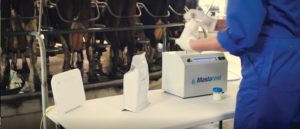
Mastitis is a problem that no farm can avoid, however, by lowering rates and increasing response, the treatments are all steps in the right direction. A number of different pathogens are responsible for being the causal agents in mastitis cases, and understanding what we are dealing with can help tailor a treatment plan which is both more effective and potentially cost-saving for you as the farmer. Within Vetlife we have an ability to do just this with the use of inhouse Mastatest® machines.
Part of the success we have had with Mastatest® is the ability to receive results within 24 hours of testing and so provide appropriate treatment at an early stage. This aids in delivering more successful outcomes for the cow. Many of our dairy practices within Vetlife are equipped with their own Mastatest® machines, thus enabling us to provide a quick and efficient service for clients. When the testing is complete, the results are sent straight to the farmer`s and veterinarian’s emails with an interpretation of the results (including pathogen and sensitivities) showing which treatment is likely to have the best response.
The use of Mastatest® and other forms of milk culturing provides clients with more information on selective treatment, and this in turn helps to reduce unnecessary orange and red antibiotic drug usage. Not only does this allow the farmers to be contributing to antimicrobial stewardship, but it will also allow them to save money on unnecessary products that might be completely superfluous in their given situations.
On-farm use of Mastatest®
In the past, there has been an array of different testing units/media on farms. Many of these have been time-consuming to set up and load while also requiring a skilled enthusiastic person to interpret the results. We can now offer the purchasing of the Mastatest® unit and cartridges for point-of-use on farm. We currently have some farms actively using these machines, and they are having great success. As mentioned previously, the system is quick and easy to load and provides results within 24 hours of testing. If you are considering this as an option, please contact your Vetlife veterinarian to discuss the machine and its use in more detail and to work out if this would work in your farming system.
Susan Geddes,
Vetlife Oxford